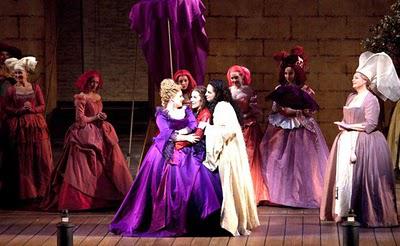
The theater within a theater. Diana Damrau, Joyce DiDonato and Juan Diego Florez in Le Comte Ory.
Photo by Ken Howard © 2011 The Metropolitan Opera.
Five Operas...About Opera
Wagner: Die Meistersinger von Nürnberg
The most famous (or infamous) response to musical criticism (not to mention the longest) Wagner's lone comedy is the story of a young knight whose radical ideas shake the staid burghers of Ye Olde Nuremberg. Meistersinger was also Wagner's way of getting back at acid-tongued Vienna critic Eduard Hanslick, who championed Brahms even as he decried Wagner's so-called "music of the future."
The story goes that at a private reading of the libretto, the critic was so enraged at the appearance of a character named "Hans Licht", that he stormed out of the room. That character's name was later changed to Sixtus Beckmesser.
Read more about Die Meistersinger with the Superconductor review of a 2008 DVD from Bayreuth.
Offenbach: Les contes d'Hoffmann
The titular character of Offenbach's final opera was himself an opera composer. Hoffmann opens at a tavern next door to an opera house which is currently staging Don Giovanni. In fact, the poet spins his three tales during the performance, which features his current obsession, the singer Stella. Two of those stories involve singing: the tale of the doll Olympia (whose "Les oiseaux" never fails to bring down the house) and the doomed opera singer Antonia, who expires onstage after her final high C.
Read the Superconductor review of the Met's September performance of Les contes d'Hoffmann.
Puccini: Tosca
The title character of Puccini's drama is an opera singer. In the second act, she fulfills a professional obligation, singing a cantata underneath Scarpia's offices in the Palazzo Varnese. Tosca is enjoying a revival at the Met right now, which makes the big opera house even more "meta."
Read the Superconductor review of this season's revival of Tosca.
Strauss: Ariadne auf Naxos
Fer cryin' out loud, the Prologue of Richard Strauss' opera opens backstage at an opera company, in a private theater in the home of "the Richest Man in Vienna." The harried Composer is a prominent character, along with the tenor, the prima donna, and the Dancing Master. The second half is the opera itself, replete with comic interruptions.
Read the Superconductor review of last year's Ariadne auf Naxos
Pfitzner: Palestrina
Hans Pfitzner's opera is set during the Council of Trent, and is about the crisis faced by a composer under pressure from the Catholic Church to produce music that will (theoretically) save the idea of church music and eventually pave the way for Pfitzner to write an opera called...Palestrina. You get the idea. The best moments of Pfitzner's opera come when a choir of angels descends and inspires Palestrina to get to work. It's at the end of the first act.
Read the Superconductor review of Palestrina, a 2009 DVD version made in Munich.

